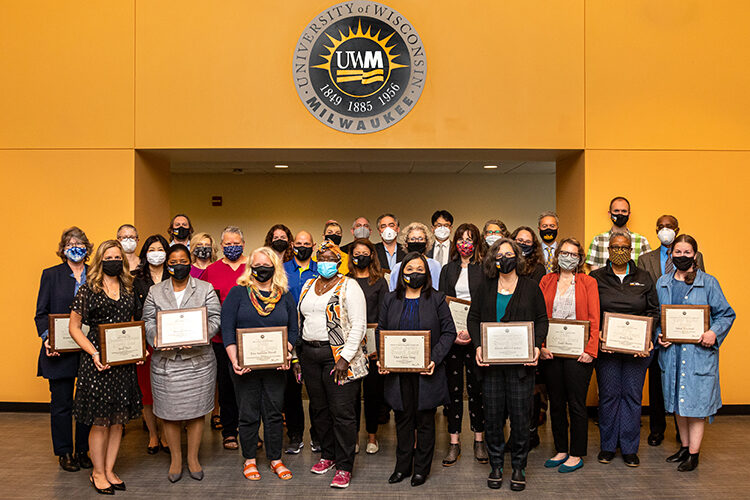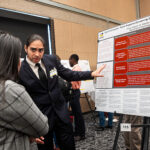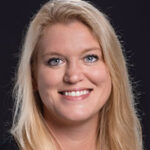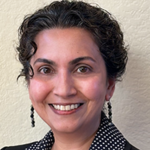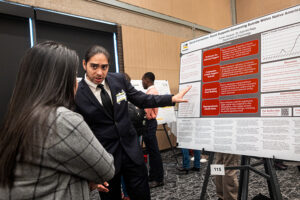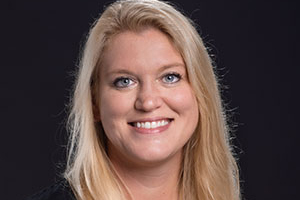More than two dozen UWM faculty and staff members were recognized for their outstanding service to UWM during the annual Fall Awards presentation on Oct. 13. The ceremony was held in the UWM Student Union Ballroom and was livestreamed. The event can be viewed online.
UWM Distinguished Undergraduate Teaching Awards
Lisa Hager, associate professor of English & gender, sexuality, & women’s studies, UWM at Waukesha
Lisa Hager leverages her feminist teaching approach to connect with students holistically to address learning needs and challenges. She incorporates often overlooked, but representative texts across her courses to include minority authors and perspectives, allowing students to see themselves in the work and appreciate the complexities of different positionalities (differences in social position and power) across race, class, sex, sexuality and other intersections. She also uses online tools, such as Hypothesis (an online group annotating software) to encourage students to learn while creating a supportive classroom community.
“She was particularly helpful for students and other instructors in the transition to online teaching during the pandemic by cultivating resources for students in academic and mental health and offering resources she has developed for other instructors to use,” colleague Jill Rinzel, associate professor of psychology/education wrote in her nomination letter.
Aki Roberts, associate professor of sociology
Aki Roberts focuses on helping her students succeed. She implements interactive lectures, uses a range of software applications, and even shares meals with students during review sessions to help students develop an appreciation for and competence in statistics. In addition, she developed a textbook to make statistics easier to learn through clear language and examples for her students. Finally, she was instrumental in creating the Quantitative Social Data Analysis (QSDA) certificate program so that students could not only develop skills but demonstrate that accomplishment upon graduation.
“Professor Roberts’ teaching methods made material that was entirely new not only manageable, but exciting,” wrote one of her students, Hannah Smith, who was also Roberts’ teaching assistant. “Through her encouragement and guidance, I chose sociology to be both my undergraduate major and my career pursuit through the master’s program.”
Tricia Wessel, associate professor of psychology and education, UWM at Washington County
Tricia Wessel carefully designs rigorous coursework, including metacognitive activities and scaffolded assignments to foster student learning and success. She regularly teaches students content as well as life skills to help them learn how to succeed in college and find their academic path. In addition, she has developed a role-playing video game to allow students to interact with class content, enhancing student engagement and application.
“Dr. Wessel has a strong record of excellence in the classroom and goes above and beyond her duties to make sure students are successful not only in her courses, but at the University and beyond. She teaches both psychology and education courses and emphasizes critical thinking and application to real world challenges in all her classes, wrote four of her colleagues in a nomination letter.
UWM Distinguished Public Service Award
Leslie Harris, associate professor of communication, Portia Cobb, associate professor of film, video, animation and new genres, and Erin Sahlstein Parcell, professor and chair of communication, have worked collaboratively with community partners and undergraduate/graduate student research assistants to bring the “Voices of Gun Violence” project to fruition, serving the Milwaukee and surrounding areas. “Voices of Gun Violence” is a living archive of the stories of gun violence that affect individuals, families, and communities.
This collaboration with Mothers Against Gun Violence seeks to share stories of pain and resilience to promote healing, understanding, and community action. In addition to developing the interactive website to house and archive victims’ experiences, members of the collaboration engage in public presentations to heighten awareness and reduce gun violence.
“The project brings awareness and preserves a public record of the devastating toll that gun violence takes on individuals, families and communities,” communication Professor Kathryn Olson wrote in support of the nomination. “It is a powerful, multifaceted public service effort that they have sustained and cultivated for several years and that contributes to the public good, lives out UWM’s mission to make an impact beyond the campus community and enhances the university’s reputation.”
UWM Distinguished University Service Award
Shevaun Watson, associate professor of English
Shevaun Watson directs the first-year composition program and coordinates between 275 and 300 sections that serve approximately 6,000 students annually. Her program innovations, adjustments to student placement procedures to be more inclusive and equitable (during COVID-19 and beyond), outreach efforts as a leader in the M-Cubed (M3) program, and budget planning work for the university and college make her an excellent nominee for this award.
“Shevaun’s impact on UWM is remarkable: She has redesigned courses, transformed the pedagogies of dozens of UWM instructors, and educated and empowered thousands of students, wrote Vicki Bott, senior lecturer and English Department manager, office of Dual Enrollment, Academic Affairs. “Her research and commitment to literacy to literacy and social justice is a guiding beacon for our program, the English Department, UWM and Milwaukee.”
Clark Evans, professor of atmospheric science
Clark Evans provides extensive service in his role as the Atmospheric Science program chair and Letters & Science faculty recruitment ambassador. He has spearheaded and developed effective and noteworthy recruitment and retention programs that have enhanced the Atmospheric Science program’s reputation and increased enrollments. He also has engaged in numerous outreach efforts on behalf of his department and the university to increase interest in the natural science programs at UWM.
“Whether big — such as leading the process that saw UWM designated as Wisconsin’s first StormReady university — or small, such as sending admitted undergraduate students personalized congratulatory postcards, these actions further support Professor Evans’ standing as service leader among the faculty,” according to a letter supporting his nomination.
Hanjoo Lee, professor of psychology and director of the Anxiety Disorders Laboratory
Hanjoo Lee facilitated the transition of the Anxiety Disorders Laboratory to an online platform by putting processes in place and designing software to protect patient interactions and data, saving the department $5,000 annually. In addition, Lee redesigned and streamlined graduate program procedures. This enhanced the department’s ability to attract and retain high quality students. He continually updates and expands this system to help the clinic in providing much-needed telehealth services.
“I, my colleagues, the students and our patients are wholly indebted to his enormous contribution, which allowed the students to continue their training, the patients to continue to receive the services they needed, all the while allowing everyone to remain safe and healthy at home during global pandemic,” wrote Psychology Clinic director Stacey Nye.
Office of Research and UWM Foundation Research in the Humanities Awards
Elana Levine, professor of English
Since the debut of “These Are My Children” in 1949, the daytime television soap opera has been foundational to the history of television as an economic, creative, technological, social, and cultural institution. In her 2020 book, “Her Stories: Daytime Soap Opera and US Television History,” Elana Levine draws on archival research and critical analysis to provide an in-depth history of the daytime television soap opera as a uniquely gendered cultural form and a central force in the economic and social influence of network television.
A Glasgow University fellow calls it “crucial reading for media studies scholars and anyone interested in the social and cultural history of the United States in the twentieth century.” A UW-Madison professor considers it “one of the best books to be published in the field of television studies in the past decade — the sort of book most scholars aspire to complete during the course of a career.”
Mark Netzloff, professor, literature and cultural theory coordinator
Mark Netzloff’s book, “Agents Beyond the State: The Writings of English Travelers, Soldiers, and Diplomats in Early Modern Europe,” provides the first book-length study of the connections between literary writing and the emergence of the English state in the early modern period.
In the book, published in 2020 by Oxford University Press, Netzloff argues that the early modern state was defined not through the elaboration of theoretical models of sovereignty, but rather as an effect of the literary and social practices of its extraterritorial representatives. Focusing on four groups of agents — travelers and intelligence agents, Catholic exiles, mercenaries, and diplomats — “Agents Beyond the State” examines their material practices of writing, networks of association, modes of affect and sociability, and formulations of agency and critique.
A professor at the University of Minnesota writes that the book “will seal his reputation as one of the top scholars working in the field.”
Office of Research and UWM Foundation Research Awards
Ira Driscoll, associate professor of psychology
Ira Driscoll studies how changes in the brain can predict cognitive deficits and dementia, and the role for hormones and genetic background as modulators of age-related cognitive decline. Focusing on the function of the hippocampus and the nature of amnesia in aging and Alzheimer’s disease, she employs a multi-level investigative approach combining neurogenetics, neuroimaging and cognitive tasks that allow for cross-species comparisons.
She has also done research suggesting that while obesity in middle age is associated with heightened risk for cognitive impairment in post-menopausal women, weight gain in elderly women may help preserve cognitive function.
A reviewer at Wake Forest University notes that “Dr. Driscoll has built a clear and impressive trajectory in her research aimed at understanding how Alzheimer’s disease develops.”
Recognition of her accomplishments includes the 2014 Alzheimer’s Association of Southeastern Wisconsin Investigator Award and the 2006 National Institute on Aging Fellows Award for Research.
Carolyn Eichner, associate professor history & women’s and gender studies
Carolyn Eichner is an internationally recognized scholar of French feminist history, particularly women and gender in 19th-century French political and social movements.
Eichner has published extensively on revolutionary women, feminism, imperialism, and gender in France and its empire. UWM History Department chair Joseph Rodriguez writes, “Her work is cutting edge — revealing the stories of French women who previously languished in historical obscurity. The freshness and originality of her work has attracted an international audience, and much of her work has been translated into French. Her first book is regularly used in women and gender and French history courses.”
Eichner’s French translation of her 2004 book on women in France’s revolutionary civil war, “Surmounting the Barricades: Women in the Paris Commune,” was a finalist for the prestigious Prix Augustin Thierry, given by the City of Paris to recognize historical work focusing on the period between Antiquity and the late 19th century. Her second and third books, “The Paris Commune: A Brief History” and “Feminism’s Empire,” are forthcoming in 2022.
Clark Evans, professor of atmospheric science
Clark Evans has expertise in weather analysis, forecasting, and numerical modeling, particularly their transition into extratropical storms when they reach higher latitudes. This transition phase is very challenging to predict, and it can bring surprisingly severe weather. His 2017 review paper described the global climatology of extratropical transitions, their predictability and societal impacts, and provided recommendations for future research. The paper has been cited over 85 times in the academic literature.
Evans’ award nominators cite his extensive record of conducting societally relevant, extramurally funded research on high-impact weather in collaboration with the National Weather Service and its Storm Prediction Center, as well as the National Hurricane Center. He is a principal investigator on $4 million in research grants. At the American Meteorological Society, Evans is chair of both the Committee on Weather Analysis and Forecasting and the Annual Meeting Oversight Committee. He is also an editor of the Monthly Weather Review.
Nicholas Silvaggi, associate professor of chemistry
Nicholas Silvaggi is internationally recognized for fundamental contributions in enzymology and structural biology. His expert X-ray crystallography has helped determine molecular structures in complex biological systems —essential knowledge for characterizing binding sites for small molecules, which provides crucial insight into the rational design of potential drugs. His expertise contributed to the 2011 founding of the Milwaukee Institute for Drug Discovery at UWM.
A highly sought-after collaborator at regional research institutions and at UWM, Silviaggi collaborated with UWM Professor David Frick to expand knowledge about the structure and possible therapeutic approaches to SARS-CoV-2, the virus that causes COVID-19. Continuously funded by the National Science Foundation since 2012, Silvaggi has attracted three major research grants, been a co- principal investigator on two National Science Foundation major instrument proposals and has received National Institutes of Health funding.
Silvaggi has served on more than 30 PhD and five master’s committees — chairing five of them — and advised 41 undergraduates. He is also a mentor for the Milwaukee School of Engineering’s SMART team high-school outreach program.
Office of Research/UWM Foundation/Senior Research Awards
Anne Basting, professor of English
Anne Basting is a scholar and artist whose work focuses on the potential for the arts and humanities to transform our lives as individuals and communities. For over 20 years, Basting has researched ways to infuse the arts into care settings, with a particular focus on people with cognitive disabilities like dementia.
In 1998 she founded the award-winning nonprofit TimeSlips Creative Storytelling, an international alliance of artists and caregivers bringing meaning to late life through creativity. TimeSlips has over 900 certified facilitators in 48 states and 20 countries. The aim of creative storytelling, Basting says, is to replace pressure to remember with freedom to remember, imagine, and inspire improvisational expression. In all her work, she is striving toward a moment when meaning-making is fully infused into care systems.
In 2016, Basting became the first MacArthur Fellow at UWM. She has published many books, articles, and chapters, and the longtime theater professor has also written or produced nearly a dozen plays and public performances, one of which was professionally staged at a long-term care community.
Bonnie Klein-Tasman, professor of psychology
Bonnie Klein-Tasman has earned a national and international reputation for her developmental work on children with rare genetically based neurodevelopmental conditions, particularly Williams syndrome and neurofibromatosis type 1. She takes a sophisticated approach to incorporating projects that capture the interplay of social, neuropsychological, and developmental factors in predicting child outcomes.
To collect the large amounts of necessary data from youth who are relatively hard to find in the first place, Klein-Tasman’s team has become very creative about locating and connecting with these families. This data can help identify emerging patterns of specific difficulties at specific developmental periods — valuable information that is unavailable for most genetic conditions.
Klein-Tasman has a strong commitment to training future scientists; she has chaired 13 Ph.D. committees, 13 master’s committees and eight senior thesis committees. Grants supporting her research have come from the National Institutes of Health, Williams Syndrome Association, UWM Research Growth Initiative and many others.
Chia Youyee Vang, professor of history, interim chief diversity, equity and inclusion officer
Chia Youyee Vang is recognized for groundbreaking research into the Hmong diaspora, other Southeast Asian diasporas and refugees, and community-building efforts among Hmong people in the United States. One of her peers calls her “unprecedented” — the only full professor of Hmong studies, the first Hmong American woman to perform research in these areas, and the first woman to build a Hmong certificate program, which she founded in 2009 amid growing demand for coursework reflecting Asian American life experiences.
Her two most recent books tell stories of Hmong fighter pilots — who flew for the U.S. military in the secret war in Laos during the Vietnam War, including a pilot who was shot down in 1972 and presumed dead, but was held in a communist POW camp for years after the United States withdrew from Vietnam.
Her 2019 book, “Fly Until You Die: An Oral History of Hmong Pilots in the Vietnam War,” “enlarges and transforms the history of the American war in Vietnam,” a reviewer writes.
Academic Staff Outstanding Teaching Awards
Kimberly Hernandez, lecturer, comparative ethnic studies
Kimberly Hernandez has created and taught a wide array of innovative new courses in history, ethnic studies and Chican@ and Latin@ studies. She also mentors undergraduate students, helping them connect their own experiences with broader histories of immigration, urban life and social justice. She herself returned to school as a nontraditional undergraduate and has become a nationally recognized historian of immigration and urban history.
Her integration of research into all of her courses has allowed her to launch many students into ongoing research projects that they have continued beyond her class.
“Despite teaching in a new-to-her field, Dr. Hernandez has become a capable and popular instructor in Comparative Ethnic Studies,” wrote history Professor Rachel Ida Buff, coordinator of that program. “Her student evaluations attest to her passion, preparation, and commitment to student success.”
Matthew Knachel, senior lecturer
Knachel’s teaching and leadership have helped make Philosophy 111 and Philosophy 21 – the logic courses in the Philosophy Department – more enticing to students. His open-source logic textbook, “Fundamental Methods of Logic,” has been adopted at a number of universities, and has been downloaded more than 20,000 times in 154 countries.
The comment that recurs most often in student evaluations of his teaching is that Knachel works hard to make the course material – which some students find difficult and boring – engaging, enjoyable and even fun. He does all this without watering down the content.
Knachel makes the learning itself enjoyable for the students, and he helps motivate the students by helping them to be successful, wrote Blain Neufeld, associate professor in the department. “Given the difficulty level of the course content, it is very significant and striking that almost all of Knachel’s students finish and pass the course.”
Ali Gattoni, assistant faculty associate
Ali Gattoni teaches courses in organizational communication. She motivates learners through effective and innovative content delivery, creating connections with and between students. She teaches organizational communication theories by having students work together on a variety of hands-on group projects from marshmallow-noodle towers to paper boat building. For example, students learn classic management and communication techniques by working together to build as many paper boats as possible in an assembly line. When an authoritarian approach is used to direct students to work harder and faster, students “live” that theory and the negative feelings it can generate. This helps them understand and retain the approach better.
“When I visited her in-person class, it was evident students were excited to be there and looking forward to learning,” wrote Sarah Rilgoforte, associate professor of communication, in nominating her. “I arrived over 10 minutes early and students were already sitting at tables talking in groups.”
Academic Staff Outstanding Performance and Service Awards
Heidi L. Plach, clinical associate professor and academic fieldwork coordinator, Rehabilitation Sciences and Technology
A theme of Heidi Plach’s professional work is mental health and especially mental health related to military veterans. She has served on committees and advocated for these causes at the university and in the community.
During the recent pandemic year, Plach’s efforts in finding safe fieldwork placements for students helped UWM students continue their fieldwork to graduate in December 2020. At UWM, 99% of the students in the program were able to complete the program on time, compared to a national average of 31%.
“Heidi is dedicated and applies her efforts far and wide to serve our students, faculty and staff, university and community, wrote Jay Kapellbush, associate professor and chair. “This makes her a valued partner and, in turn, helps her to pull together amazing accomplishments like the one we in the OT Program were privileged to witness this past year.”
Ramona Sledge, multicultural student success coach and advisor, Black Student Cultural Center
Ramona Sledge has served as a counselor and supporter for thousands of students in her 20-plus years at UWM. Above and beyond that, she has worked tirelessly on organizing an annual summit for Black male youth that has been held on the UWM campus since 2007. Although the most recent event was canceled because of the pandemic, over the years it has grown from a few hundred participants to several thousand from all over Wisconsin and northern Illinois.
In addition, she worked with other members of the Multicultural Network to establish a Multicultural Fall Welcome, which helps new students meet faculty and introduces them to the campus offices that can help support them.
“She works sometimes 12 to 14 hours a day between advising and Summit programming activities,” wrote nominator Anique Ruiz, chair of the Multicultural Network and program manager of the WiscAMP STEM-Inspire program, “only to leave campus by bus to assist seniors at a nearby memory care center in the evenings. She is truly a remarkable person.”
Jean Salzer, director, Career Planning and Resource Center
Jean Salzer has been serving students of all backgrounds for more than 25 years, and is a champion for students with special needs. She has written grants and served on university and state-wide committees to improve accommodations for those with special needs. Among the many projects she worked on was helping University Information Technology Services improve classroom accessibility using assistive technology. She has also worked closely with the UWM Multicultural Network to provide updates on career development and advancement opportunities for students of color.
In recent years, Salzer has collaborated with the M-cubed partners to help incorporate inclusive career planning for professional success into the work UWM is doing with Milwaukee Public Schools and Milwaukee Area Technical College.
“She comes to work every day eager to enhance the student experience and consistently puts her innovative thinking and commitment to diversity, equity, and inclusion to work,” wrote Kay Eilers, associate vice chancellor for enrollment management.
University Staff Outstanding Service Awards
Therese E. Bohn, technical training & documentation manager, University IT Services
Therese Bohn is one of many unsung heroes who helped keep UWM functioning well during the pandemic. When COVID-19 hit, she played a key role in quickly expanding planned training when there was suddenly an immediate demand for all the Teams calling, meeting and events functions. During a first online training session she set up on March 27, 2020, 275 faculty and staff attended. Eventually, she helped more than 700 faculty and staff learn to use this tool, which became so vital to continuing university operations.
Her assistance was also essential in supporting the many campus events that had to move online – from the Length of Service awards to the Dialogue on Racial Justice Series.
“I am so proud of the work and impact Therese made this past year in making so many elements of our transition a success,” wrote Bobby Jo Morse, associate director of IT professional services.
Keith Emmons, manager of the Windows Device Management Group, Campus Technology Support
Shortly before the pandemic struck, Keith Emmons had taken on extra duties when a team member moved out of state. With the pandemic, he and his team faced a new challenge – designing and building remote labs to connect students to existing hardware in campus computer labs.
He rapidly found ways to make those labs work remotely, easing the stresses on already stressed students. His team worked with him to research and test options for connecting students and staff to labs in departments all over campus. Earlier versions of remote computing had been expensive, but Emmons led the team that found a way to design a lower-cost alternative using existing resources.
“Thousands of students have used the Remote Labs over the last year to connect to the discipline-specific software that they would otherwise be unable to use for their classwork,” wrote James Kavanagh, CTS director in nominating Emmons. “Keith built a new bridge between these students’ homes and the computer labs they needed to succeed.”
Lauren J. Wieczorek, academic department specialist/department manager, Department of Geosciences
Lauren Wieczorek handles all the administrative work of the Geosciences Department. She also helps out the director and teaching staff of Conservation and Environmental Sciences, an interdisciplinary program with no office staff.
Managing and supporting the Geosciences Department is challenging with faculty, staff and students staff traveling to and working at field sites across the U.S. and around the globe. Wierczorek handles all the paperwork, travel arrangements and logistics for field trips that can range from one day to several months. That may include not just the typical travel reimbursement and lodging, but renting buses, vans, off-road vehicles and even helicopters.
“Lauren’s attention to details has allowed the faculty and staff to conduct teaching and research all over the world, wrote John Isbell, distinguished professor, who nominated her. “She has freed us up so that we can concentrate on the actual work rather than worrying about the administrative details.”
Shane Haensgen, doctoral retention advisor, Graduate School
Shane Haensgen is responsible for keeping track of the progress of doctoral students across all schools and colleges. In addition to dealing with pandemic-related issues, he had to help resolve additional problems over the past year.
One was a troublesome computer program, Doctoral Milestones, used to track student progress toward degrees. When the system failed to work as planned, he helped identify issues, and temporarily moved the work to manual processes. He continued to work with developers until problems were resolved. At the same time, he and another employee had to clear a huge backlog of graduation applications caused by an unexpected staff shortage.
“Shane is a shining example of a higher education professional that put the student’s needs, values, and goals first,” one student wrote to Interim Dean of the Graduate School Jason Puskar, who nominated Haensgen. “I wanted you to know that his hard work and dedication to my concerns have made a massive difference in my ability to finish my program on time and not take on working 80-90 hour weeks while a full-time student.”
LGBTQ+ Award
Devin Thomas, clinical assistant professor and field liaison, Helen Bader School of Social Welfare
Devin Thomas places bachelor’s and master’s degree social work students in field placements/internships. She has connected students interested in focusing on LGBT issues in placements related to HIV/AIDS, reproductive health, domestic violence, mental health services, youth programming and medical health care.
In addition, she introduced pronoun awareness to the department and school. She surveyed students every semester to see how they would like to be addressed and if there is anything she should know to help them feel accepted and included. She incorporates materials into her curriculum that are inclusive of LGBT representation, and is a resource for students who are in the process of coming out.
In addition to raising awareness within the department and the school, she participates on the advisory board of a UWM psychology research project that focuses on alcohol-related intimate partner violence among LGBTQ+ young adults (18-25 years old). She has connected community members to this research so they can learn more about alcohol and intimate partner violence.
Excellence in Teaching with Technology-Joanne Lazirko Award
Nikole Bouchard, associate professor of architecture
Nikole Bouchard was a leader in integrating technology into architecture courses during the pandemic. Starting in the spring of 2020, she crafted new assignments that creatively used Zoom, Instagram, Miro Boards and smartphones in ways that hadn’t been used in the field before.
For example, after surveying students, Bouchard recognized that many students didn’t have easy access to computers and high speed internet, but everyone had a smartphone. So, she developed ways of offering course materials on smartphones using annotated PDFs with an abundance of hyperlinked resources.
Another innovation was the use of “Weekly Explorations” to inspire students to work creatively with what’s around them by using recycled materials. Students submitted their work to their course Instagram account directly from their phone. Weekly small group sessions in Zoom rooms kept the students and teaching assistants in touch.
Her work was “absolutely transformational for SARUP,” wrote her colleagues in the nomination letter. “Nikole is paving the way for other SARUP faculty to use technology in ways that enhance learning and increase engagement with course materials and classmates to ultimately ensure student success.”
Ernest Spaights Plaza Award
Larry G. Martin, professor emeritus, Department of Administrative Leadership
Larry Martin, professor emeritus in the School of Education, dedicated his career to adult education. His research and publications focused on the trends and issues that keep adult learners, particularly those who are low income or people of color, from participating in adult education.
He was also a leader of UWM’s diversity and inclusion efforts.
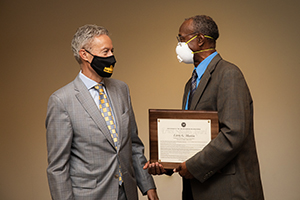
During his 35 years as a scholar practitioner and leader in urban adult and continuing education, he also served as chair of the Department of Administrative Leadership and director of the urban education doctoral program. He retired in 2015.
Martin wrote numerous journal articles and book chapters, co-edited a four-volume compendium on adult education and published three New Directions series books. He served on the editorial boards of many scholarly journals in the field of adult education, and presented at national and international conferences.
Martin’s work led to change. In 1987, he published a study of policy changes to Wisconsin’s General Educational Development (GED) score requirements. His research showed that the changes had negatively affected students – increasing failure rates and lowering persistence levels, leading to a loss of educational and employment opportunities among adults seeking a GED diploma. As a result, the Department of Public Instruction changed the requirements while still maintaining the state’s high standards. More than 800 adults were retroactively awarded their GED diplomas and thousands more have benefited with increased employment and education opportunities.
In addition to his research and scholarship, he received high ratings for his teaching. Students appreciated his passion and the care he provided. In his years of leadership of the urban educational doctoral program, he established an annual research forum that brought in nationally known scholars.
Within the profession, he served on state and national organizations for adult education. As a result of his continuing work, he was inducted into the International Adult and Continuing Education Hall of Fame in 2015.
Martin used his knowledge of adult and organizational learning to lead a campus-based Task Force on Race and Ethnicity, which brought together more than 60 faculty, academic and classified staff and students. The two-year project resulted several major changes to the university’s diversity and inclusion efforts.
In nominating him, his colleagues said that his scholarship, service and leadership have given voice to the voiceless, empowered the disempowered and informed the uninformed. There is no doubt that Dr. Martin’s contributions helped UWM become a more inclusive, equitable and better place to work.
